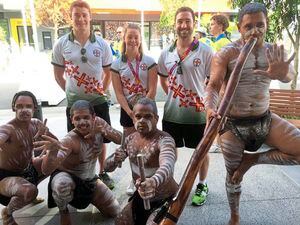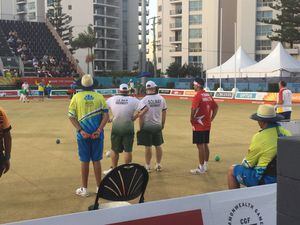Cut in compulsory sports at Commonwealth Games ‘necessary’
THE Commonwealth Games Federation’s landmark decision to scrap almost all their compulsory sports programme was ‘necessary’ for the quadrennial event’s future.

That is Guernsey Commonwealth Games Association chief David Harry’s view following the CGF’s release of a ‘strategic roadmap’ where swimming and athletics are the only compulsory sports hosts must stage – there were previously 16.
The CGF made this decision to give potential hosts liberty to choose sports, making it easier to come forward.
But it casts a shadow over sports such as bowls and cycling, which attract widespread Guernsey representation but are no longer certain fixtures at future Games.
Harry admitted that the urge to find a 2026 host within the next year – which was in doubt – outweighs this.
‘If the Commonwealth Games are unable to attract a host city for 2026 or 2030, then there will not be a Commonwealth Games held in that year,’ he said.
‘That affects the whole of the 72 countries and territories.’
For that reason, the GCGA figurehead supports the CGF’s decision, which was accepted unanimously by other nations.
‘In a way, I would have preferred that it was not necessary, but it is necessary,’ he added.
‘It was the best solution that could be made at the current time.
‘It’s a solution for 2026 and 2030 and it could be in 2034 that something else happens.’
Hosts will look to take the bulk of future Games programmes from around 25 core sports, with a recommended figure of 15 apiece.
The significance of compulsory status has already been felt in shooting, which was demoted to optional in 2015 and then excluded from the Birmingham 2022 programme.
Guernsey Rifle Club’s Peter Jory commented in response: ‘We have a number of international competitions that we shoot and it’s only one small portion of what we do – we’ll just have to make the most of what we have going.’
Harry knows other sports may suffer similar fates.
‘All the sports may come in and come out in a cyclical Games if the infrastructure’s not currently available in that host city – it’s just a risk that sports take,’ Harry added.
‘That happens anyway – there’s no shooting in Birmingham 2022, because they had decided that they would try to hold it in a different way [in India this winter] and sadly, because of Covid, those plans fell through.’
One sport of Guernsey concern is bowls, for which the Commonwealth Games are a major aim for the top Sarnians, up with the European and World Championships, and where there is currently no Olympic competition.
Bowls Guernsey president Garry Collins is, however, fairly confident of the sport’s future at Commonwealth level.

‘We were informed of the proposed changes a few weeks ago now at the recent Guernsey Commonwealth Games meeting, so it’s not a total shock,’ he said.
‘We have been very lucky as a sport to have been in the Games since 1930 as a core sport.
‘The CGF has been making sports and countries aware for some time changes are needed to secure future hosts.
‘As a sport, bowls is very popular in the UK, Australia, New Zealand and Canada, so we stand a very good change to be in future Games as these countries host the Games.’
As a World Bowls board member, Collins also notes that the sport is pushing for Olympic inclusion with Brisbane 2032 in mind.





